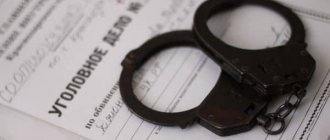In Russia there is an increase in the number of fraudulent activities. In a situation where a citizen’s property or money was obtained not through secret theft, but through deception or persuasion of a person (abuse of his trust), the actions of the attacker are qualified as fraud. But it is difficult to prove the fact of a crime, because the attacker himself does not admit to committing fraudulent acts. Consequently, in court it is necessary to prove the fraudster’s intent, and if the crime was committed by a group, a preliminary conspiracy. We will tell you how to do this in practice in this article.
Collection of evidence
Fraud is dangerous because the criminal obtains money or other material assets by deception, and it is extremely difficult to prove this fact.
The easiest way to get your funds back is if the borrower agreed to write a receipt. If there is no documentary evidence of the transfer of funds, then it is necessary to look for another way to convince law enforcement agencies of falsification and deception on the part of the accused. Modern technologies open up broad prospects for Russians. Evidence can be obtained in various ways, without the need for a receipt. The investigative authorities will take into account the fact obtained through SMS messages, email correspondence, audio or video recordings
It is important not only to record the fact of communication with the attacker, but also to force him to admit:
- presence and amount of debt;
- the fact of deliberate deception of money;
- return deadlines.
A fairly common way to deal with criminals is to contact collection agencies. These private organizations will try to repay the debt by any means, but we must remember that their actions also do not always meet the standards of the current legislative framework.
Today, fraud can be classified according to the nature and composition of the offense. Among the most common options are Internet scams, telephone scams, street scams, etc.
What is a receipt?
A receipt is a written document confirming the fact of transfer and receipt of money or material assets, as well as the grounds for such actions. A receipt is written in the case of oral agreements, and confirms that the parties to such an oral agreement have fulfilled their obligations.
The receipt may not be notarized. To protect yourself, when transferring and receiving money, you can invite witnesses who will also write on the receipt that they were present during the transfer and receipt of money, and also know why the money was transferred.
How to prove fraud without a receipt, and is it necessary to do so?
And if he categorically denies receiving funds, all that remains is to trace the path of the illegally appropriated money. It is clear that a small amount of money cannot be traced. But with a big one it’s much easier. Surely the scammer used the funds received to purchase something valuable, such as a car, real estate, travel, etc. Most likely, he told you about this. Therefore, as soon as you learn from the investigator that the fraudster does not admit to receiving money, you should ask the investigator to check the recent acquisitions of the fraudster and his close relatives.
What if the receipt was related to the execution of the transaction?
When making oral transactions, receipts are often issued confirming receipt of money for a product or service. The most common fraud in such cases is denial of receipt of funds.
Again, in order to be able to punish the fraudster, you need to oblige your partners to indicate in the receipt the purpose of the funds received. Otherwise, the fraudster can say that this is a loan, return the money and demand the property back. Or that this money relates to a completely different transaction altogether.
But the law in this case is on the side of bona fide counterparties. A receipt is recognized as adequate confirmation of receipt of money even in those transactions where the law prohibits cash payments. For example, between legal entities.
Features of fraud in business activities
- Intentional excess by a manager of permissible capabilities, which consists in signing documents that he is not authorized to endorse or when the conditions of the internal company environment do not allow this to be done, because the obligations cannot be implemented.
- Drawing up an agreement containing in the text features that exempt the entrepreneur from performing duties on pseudo-legal grounds.
- Attribution of work or services not actually performed, or goods and components not actually supplied.
- Fraud in obtaining a loan from a financial institution without valid collateral or at an unreasonably low interest rate.
- Providing loans with hidden fees that significantly worsen official conditions.
Fraud by the defendant on the receipt
Article 159 of the Criminal Code of the Russian Federation defines fraud as the theft of someone else's property, including money, committed by deception or abuse of trust. Thus, the mere fact of taking someone else’s money is not a crime; it is necessary to establish signs of deception or abuse of trust in the actions of the debtor.
When making a loan between citizens, the following actions are performed, which may be important for qualifying fraud:
- all essential terms of the loan are agreed upon - the amount of funds, the transfer procedure (cash or non-cash payment), the repayment period, the amount of interest for the use of borrowed funds;
- agreements of the parties are formalized in the form of an agreement or receipt signed by both parties (if the receipt contains all the essential terms of the loan, it has the force of an agreement);
- For the legal relationship of a loan to arise, the funds must actually be transferred to the borrower.
Deception or breach of trust can be detected at any stage of the loan relationship, including in preparation for the transfer of funds. In this case, the borrower’s illegal actions should be aimed at a deliberate reluctance to repay the debt.
Let's consider typical situations when it is possible to establish a potential risk of fraud when applying for a loan using a receipt:
- the borrower agrees to any terms of the loan, including obviously high interest rates with a short repayment period;
- if, when transferring funds, the borrower asks to issue a receipt to another person not related to the loan;
- if the borrower convinces to do without a receipt, citing friendly or friendly relations.
These facts cannot clearly indicate potential fraud, but they create additional risk for the lender.
What punishment awaits
Basic Article 159 of the Criminal Code of the Russian Federation consists of 7 parts, which describe individual elements of fraud. As can be seen from the table below, several types of punishment of varying durations are provided for the perpetrators.
They are used on an alternative basis. For some particularly dangerous acts, imprisonment is inextricably linked with a large fine.
| Qualifying features | Fine | Correctional work | Mandatory work | Forced labor | Deprivation of liberty |
| without them (part 1) | Up to 120,000 rub. | up to 1 year | up to 360 hours | up to 2 years | up to 2 years (possible arrest for up to 4 months) |
| significant damage to a citizen, the presence of a preliminary conspiracy (Part 2) | Up to 300,000 rub. | up to 2 years | up to 480 hours | up to 5 years | up to 5 years |
| abuse of official position, large size (part 3) | 100,000 – 500,000 rub. | _ | _ | up to 5 years | up to 6 years + fine up to 80,000 rubles. |
| presence of an organized group, especially large size, deprivation of housing rights (Part 4) | _ | _ | _ | _ | Up to 10 years + fine up to one million rubles. |
| failure to fulfill contractual obligations with significant damage (part 5) | up to 300,000 rub. | up to 2 years | up to 480 hours | up to 5 years | up to 5 years |
| failure to fulfill contractual obligations on a large scale (part 6) | 100,000–500,000 rub. | _ | _ | up to 5 years | up to 6 years + fine 80,00 rub. |
| failure to fulfill contractual obligations on an especially large scale (part 7) | _ | _ | _ | _ | Up to 10 years + fine up to 1 million rubles. |
Depending on the situation, the court has the right to impose an additional punishment in the form of restriction of freedom on the convicted person. It provides for the imposition of restrictions on movement, visiting certain places and events.
In addition, the citizen will have to visit the local police officer for control. And this is also one of the educational measures.
Legal advice
Committed fraudulent actions at the request of the head of the department. The damage to the employer's company amounted to about 300,000 rubles. Will having children be a mitigating factor?
Yes, the presence of young children is a mitigating circumstance, according to Art. 61 of the Criminal Code of the Russian Federation. You can also voluntarily come to the police and admit your guilt. Active repentance will also be the basis for release from liability.
The social worker gained the trust of the grandmother, and she transferred the apartment to her through a deed of gift. Now the social worker is kicking the grandmother out onto the street. Can such actions be considered fraud and how to cancel the deed of gift?
Yes, this is a fact of fraud based on abuse of trust of the victim. You need to contact the police with a statement. If the grandmother has health problems (for example, with memory), this will also help win the case and invalidate the contract on the basis that the donor was incompetent.
Statute of limitations for crimes
They depend on how serious the act was. In turn, the seriousness of the offense is inextricably linked to the maximum term of imprisonment. As for time periods, according to Art. 78 of the Criminal Code of the Russian Federation the following rules for their calculation apply.
If the maximum term of imprisonment for fraud does not exceed 3 years, the person is released from punishment 2 years after the offense. When in the relevant article of the Criminal Code of the Russian Federation the limiting period of imprisonment is 5 years, then liability may occur within a six-year period.
For serious crimes (maximum imprisonment is 10 years), the limitation period is the same. Finally, for the category of especially serious cases, 15 years are allotted.
The time frame described above is calculated from the moment the crime was committed until the court verdict enters into final force. In the case of several episodes, counting is carried out for each separately.
From theory to practice
However, in practice, proposals from private investors turn out to be a trap for borrowers. Enterprising businessmen try to recruit a person for an advance payment literally at the very first communication. Usually they start by imposing intermediary services to obtain an extract from the credit history. It turns out quite quickly that the lender still needs the borrower’s credit history. The average price for a statement from “generous” investors is 600-800 rubles, sometimes they ask for 2000 rubles. Those who send the requested amount are left without a statement or credit.
The second way online scammers make money is by luring out money for a bank transfer of a promised loan. Most ad authors live not in Moscow, but in Siberia or St. Petersburg. They cannot come to the capital for a transaction, which is supposedly why they need money to send the transfer.
Banks do indeed charge a fee for transferring money. Sometimes you even have to spend money on transfers between branches of one financial institution. But no real investor will ask to transfer the commission in advance. He will simply take into account all the costs associated with applying for a loan and include them in the annual percentage.
Some so-called creditors go even further: they ask to transfer money to them for loan insurance and, of course, in the form of an advance payment. Moreover, the requested amount can reach 10% of the total loan.
Types of fraud with examples
Example No. 1 - theft of money from a bank card
I want to warn you against falling for scammers using the examples of my friends. Fraud is very common in the banking industry using card fraud and opening loans for dummies.
Example. When withdrawing cash from an ATM, merchandiser Elena Ivanova had her card details read and her account reset. As it later turned out, the ATM was equipped with a special keyboard overlay, which allowed the fraudsters to take possession of the card data and its finances.
Example No. 2 - deprivation of living space
Frauds in the real estate sector are becoming very significant in terms of losses . Fraudsters can take possession of someone else's real estate using fake documents or prepayments in fictitious transactions.
Example. Lonely pensioner A.Yu. Rodionova decided to issue a deed of gift to social service employee E.Ya. Petrenko, so that she would inspect and care for her until her death. As it turned out later, the notary and the specialist worked in tandem and deceived the old woman. No one took care of her, and the notary received his reward after the transaction was completed. As a result, the pensioner lost her living space and appropriate care.
In the insurance industry, fraudsters obtain illegal insurance payments by falsifying documents required by insurance companies. Internet scams are full of “fake” advertisements for help for seriously ill people and orphanages, dating sites take over subscribers’ funds, online stores operate as fly-by-nights, luring out advance payments from customers who have fallen for low prices for products.
How to identify and prove deception can be seen in the video:
Example #3 - fake charity
Example. Kindergarten teacher Efimova E.K. her son, whom she is raising alone, is seriously ill. The staff called out the parents of the kindergarten students and everyone who cared to help the boy. This announcement immediately appeared on social networks, but the details for the transfer of funds were indicated by someone else, and the money was received by an addressee who did not need it.
The author of the false message remains unknown to this day, but the head of the “Solnyshko” kindergarten wrote a complaint to the site asking to remove the false advertisement about raising money and demanded that truthful details be posted.
Which law enforcement agencies should you contact in case of fraud?
If a person has become a victim of fraud, then you should immediately contact the following government agencies:
- Police. This government agency will be responsible for identifying violators, as well as searching for and capturing them. This body will prove the criminal’s involvement in this or that fraud.
- Prosecutor's office. It will connect if the process suddenly reaches a dead end. The prosecutor's office will assist the police by all means in exposing the criminals.
- Court. Here the process of exposing and assigning a term or fine for the offense committed is carried out.
It is worth remembering that a fine is issued only if the person has not committed major fraud.
How to prove the fact of fraud and the involvement of the perpetrators
Questions arise: fraud on trust, how to prove it? How to prove fraud using a receipt? How to properly prove fraud without a receipt? How to properly prove intent in fraud?
First you need to try to come to an agreement peacefully, and not run to contact law enforcement agencies. In most cases, debtors ask for a deferment; in this situation, you will be able to reach an agreement. When the debtor does not make contact, you should contact the relevant authorities.
If the fraudulent borrower is not hiding, then communication with him can be recorded on audio or video. In it, the suspect must clearly articulate that he actually committed any actions against you.
During the conversation the following phrases should be spoken:
- Amount of debt.
- The purpose to which the borrower is subordinate.
- Deadline for returning money.
The more information is reflected in the recorded conversation, the easier it will be for law enforcement agencies to prove the fact of a crime. This issue most often becomes difficult due to the fact that victims of scammers are not prepared for such an outcome of events and do not leave the necessary evidence that could prove the crime.
Most often, scammers rely on the victim’s fear and take advantage of this situation. The attackers understand perfectly well that the victim is not ready for such turns of events and brazenly carry out their machinations.
In order to prove a crime, you need to collect evidence.
Article 74 lists what information may be evidence:
- Testimony of a suspected person. No one is obliged to testify against themselves. But confessions may appear if you want to reduce your sentence, since a sincere confession provides many advantages.
- Testimony from a victim of fraud. Victims of deception by unscrupulous people should think in advance about how the facts that relate to the crime committed against them will be presented. Words must coincide with real events.
- Physical evidence of fraud. These are, as a rule, funds that are directly related to the crime. They can be of different kinds: starting from any thing and ending with material means. Items such as a telephone, voice recorder, notepad, and receipt help the investigation.
It is easy to become a victim, but it is much more difficult to prove the involvement of one or another person. To win these types of cases, you need to use the help of a specialized lawyer, look for as much material evidence as possible, or entrust the case to the police.
Trial
The further stage is directly related to the filing of charges. It must be finalized by the time the investigation is completed. Then the case goes to court and the legal prairies begin. They take place in a standard manner: both parties gather in the courtroom and defend their side.
All interested parties gather in the courthouse to announce the verdict. The judge makes a final verdict, after which there are two options for the development of events:
- the sentence comes into force, the accused begins to carry out the punishment;
- The verdict is being appealed.
Repayment of debt without a receipt if there is evidence
Finally, you managed to obtain the necessary evidence, and now you need to act. First, go to the police and write a statement to initiate a criminal case for fraud.
If we refer to Art. 159 of the Criminal Code of the Russian Federation, it says that fraudulent actions include the theft of funds through abuse of trust or deception of a person. Order of the Ministry of Internal Affairs of the Russian Federation No. 736 dated August 29, 2014 established the procedure for filing and resolving applications.
Next, the application is considered by officials and a decision is made to initiate a criminal case (or to refuse to initiate a case). If a negative decision is made during the consideration of the application, then the applicant must be sent a decision to refuse to initiate a criminal case within three days; you have the right to appeal it.
Although, having in hand a refusal to initiate a criminal case, the applicant is still endowed with the legal right to file a civil lawsuit in court in order to return his money. In addition, if the refusal was caused by a lack of information about the amount of the debt, but the fact that the culprit acknowledged the debt is present, this circumstance can play the role of evidence in civil proceedings. And the victim of fraudulent actions no longer needs to seek the initiation of a criminal case.
You must understand that initiating a criminal case in such cases is a rare occurrence, but in practice it does happen. And if luck smiles on you, then this will greatly simplify the solution to the problem. Art. 44 of the Criminal Procedure Code of the Russian Federation states that within the framework of a criminal case, the victim may file a civil claim before the completion of the judicial investigation. In this case, the applicant does not have to pay the state fee, which in a regular civil claim is:
| Amount of claim | Government duty |
| up to 20,000 rubles | 4% of the claim amount, but not less than 400 rubles. |
| from 20,001 rubles to 100,000 rubles | 3% of the amount of the claim for an amount exceeding 20,000 rubles + 800 rubles. |
| from 100,001 rubles to 200,000 rubles | 3,200 rubles + 2 percent of the amount exceeding 100,000 rubles |
| from 200,001 rubles to 1,000,000 rubles | 5,200 rubles + 1 percent of the amount exceeding 200,000 rubles |
| over 1,000,000 rubles | 13,200 rubles + 0.5 percent of the amount exceeding 1,000,000 rubles, but not more than 60,000 rubles |
Appeal
An appeal in a criminal case allows you to appeal a court decision or an already passed sentence that has not yet entered into legal force. This opportunity is regulated by law and has its own characteristics.
An appeal can be filed by an accused or convicted person against whom a criminal case has been initiated under an article of fraud. In addition to him, this can be done by the acquitted person, the victim, the prosecutor, the prosecutor, as well as representatives of the parties. The remaining participants in the process have the right to appeal the court decision only to the extent that affects their rights.
Important! Relatives and witnesses of participants in the process cannot appeal the court decision.
You can appeal:
- final court ruling that has not yet entered into legal force;
- an interim decision made in a trial.
Where to submit?
You must appeal to the court that issued the sentence . This authority will refer the complaint to a second instance. According to Article 389.3 of the Code of Criminal Procedure of the Russian Federation, if a verdict for fraud was rendered in a magistrate’s court, then for further proceedings one should apply to the district court.
If the first instance was the district court, then the second instance will be either the supreme or regional court. The authority that accepted the appeal must notify the participants in the process of its receipt.
Deadlines
Article 389.4 of the Code of Criminal Procedure of the Russian Federation specifies the time frame within which a court decision can be appealed - 10 days from the date of the verdict. If the defendant is in custody, the calculation of the period will begin from the moment a copy of the decision is served on him.
If the deadline for consideration of the appeal has been missed, then the filed complaint remains without consideration . The opportunity to challenge a court decision remains in cases where it was not possible to appeal on time for a valid reason.
Attention! Before the consideration of the complaint begins, it can be withdrawn and the appeal proceedings can be terminated.
The law establishes time limits for considering an appeal in a criminal case. In the district court the complaint must be considered within 15 days, in the regional or regional court within 30 days, in the supreme court within 45 days.
What to include in a complaint?
The appeal must indicate:
- name of the court of second instance;
- details of the person filing the complaint;
- the date and number of the case, as well as the name of the court that made the decision that is being appealed;
- rights that were violated by this decision, as well as references to legislative norms;
- list of attached documents;
- signature of the person filing the complaint;
- date of filing.
Additional information may be attached to the case materials to prove the applicant’s position. These can be documents: certificates, receipts or certified testimony of witnesses. In addition, you will need to attach an explanatory statement answering the question of why this data was not provided to the court during the initial consideration of the case.
You can file an appeal either in person or on the official website of the court, as well as send a letter with notification. If the appeal is filed by a representative, then there must be a document confirming the authority of this person.
How to prove fraud without a receipt
Often, when we trust someone, we lend money and do not ask for a receipt. It may happen that our trust is abused, and after borrowing money they are not going to return the money or material assets taken. How to get a refund in this case?
Proving fraud without a receipt is not easy, but it is possible. Witnesses who were present at the transaction and are ready to give evidence or set it out in detail in writing will help us. Considering each individual case of fraud, we can say that there is always a chance of success.
If a large sum of money was borrowed, it was probably used for a large acquisition, which can be proven by sending requests to the relevant authorities - cadastral registers, tax office, etc.
It is also necessary to attach information about the property of the debtor’s relatives if, after taking out a cash loan, they made large purchases. In this case, the property of the debtor and his relatives can be used to pay off the debt. As we can see, it is possible to repay the debt with a little effort.
Peace negotiations
First of all, the most reasonable way is to try to reach an agreement peacefully. Perhaps the person has forgotten about the obligations he has accepted, is experiencing difficulties and is embarrassed to talk about them. You can contact the debtor, find out all the circumstances and secure, at a minimum, a promise to repay the monetary debt.
It would be a good idea to confirm this promise with a receipt, albeit late, indicating a clear deadline for returning the money. It is necessary to convey information that if the issue is refused to be resolved amicably, criminal prosecution will be carried out. In most cases, the issue can be resolved in this way, peacefully.
Filing a police report
If peace negotiations do not bring the desired result, what to do and how to prove fraud? In this case, you must contact the police.
The submitted application must detail:
- information about the borrower;
- the exact amount of debt and the purpose for taking it out;
- agreed return periods;
- witness statements;
- receipt, if available.
The application can be written when the loan repayment period has expired. The expiration date for the return period is indicated in the receipt.
It is important to provide the collected documents to the police. Based on the statement you wrote, investigative measures will be taken to establish the crime
If you are refused to initiate a criminal case, request a written refusal, and you can only apply to the court with it. You can also write a written claim, enter an incoming number and, again, go to court with this document. We'll talk about this below.
If your application is not put into action, or the paperwork is delayed, you should contact higher authorities or write a complaint to the supervisor of the employee who accepted the application. This way things will move faster.
Collection of evidence
When writing an application, you must provide evidence that the transaction was completed at all, money or valuables were transferred. Confirmation is provided by eyewitness accounts, negotiations and correspondence with the debtor (dictaphone recordings, screenshots of messages, emails, call details certified by the telecom operator’s office) regarding the transaction being made. The information must contain data on the amount, terms of return, place and time of transfer of money. Documents are provided in a common file and are registered as attachments when your application is accepted.
Going to court
Going to court is initiated after you have tried all preliminary measures to influence the debtor - peaceful negotiations, contacting the police. The court, as the final authority, will consider all the facts and hold the debtor accountable.
You will need all the documents prepared and collected during the pre-trial resolution of the issue - copies of statements, receipts, witness statements, correspondence, recordings of negotiations, details of calls and other evidence that the debtor’s obligations were not fulfilled in full.
Depending on the amount of this debt, a decision will be made to initiate proceedings for an administrative or criminal offense, and the debtor will be held accountable under the law for failure to fulfill obligations.
Choosing a Qualified Lawyer
If you are accused of fraud, regardless of the degree of guilt, the first thing you need to think about is a good defense . A criminal lawyer must meet a number of criteria by which he must be selected. Tips on how to choose a criminal lawyer:
- Cost of services. A good lawyer cannot be cheap, much less free. For the same reason, you should not contact specialists offering a “free consultation”.
- Reputation. A lawyer must have experience and a reputation with clients. A good indicator would be a recommendation from a close friend or other authoritative person.
- Education. The level of education of a criminal lawyer is an important indicator of his professionalism. In addition to higher education, he must be included in the register of the Bar Association and have the status of a lawyer. You can find out this via the Internet.
- Practice. The lawyer's experience and the number of cases won will tell a lot about professionalism.
- Specialization. The narrower it is, the better the lawyer understands the chosen topic. If you have been accused of fraud, you should contact a specialist who deals with similar criminal cases.
- Appearance and manners. The person who will defend the defendant in court should be pleasant to talk to and not cause negative emotions.
- Place of work. A good law firm is immediately visible. You shouldn’t trust a cramped office with a monthly rent on the outskirts of the city.
- Problem assessment. A lawyer should not promise to win even the most disastrous case from the first seconds of meeting you. Trust must be derived from a reasonable approach. A good lawyer will name the realistic chances after studying the case materials.
- Website on the Internet. Before contacting, you should study the website of the lawyer or his law office. A page on the Internet will give an initial idea of the success of a specialist.
- Personal qualities. A lawyer must inspire trust, otherwise the business relationship may not work out in vain.
Documents to be presented in court if your debt is not repaid
- statement;
- passport;
- proof;
- a certificate from the police confirming the refusal to open a case of fraud.
In your application, you must provide complete information about your case. You should note the amount lent, the step-by-step actions taken to repay the loan, and the conditions under which you repaid the funds. You must also explain why you gave the loan without asking for a receipt. If you wrote this statement to the police, then the employees will definitely conduct a conversation with the defaulter; if this does not work, then, most likely, they will open a case of fraud.
If you decide to file a lawsuit, in this case you need to do it according to the law until another 3 years have passed from the date of the loan.
And one moment. According to existing laws, if a document, in our case a receipt, was not drawn up according to the rules, then the case will not be won in court. The court has the right to declare this transaction invalid. Witness testimony, or more precisely, an oral agreement, will not be considered evidence.
When returning funds, a receipt is also issued.
Every person sometimes experiences difficult times in life. When you are asked to borrow a sum of money, be sure to think through all the consequences of such an action in advance. There are situations when the court will not be able to solve the problem. It seems like the case has been won, but your debtor doesn’t have a penny to his name. No method will help here, so be careful and try to understand the person before dealing with him.
There is no need to be good-natured and blindly believe in human honesty. Observe all the smallest formalities when drawing up the above-mentioned receipt. Also be careful when paying back the funds you borrow. Failure to comply with such basic rules may subsequently result in you having to pay twice.
In the online store
It may happen that the buyer receives a defective product. In this case, you need to write a letter in electronic format and send it to the e-mail of the store where you purchased the item. In addition to this, a letter is sent via postal services to the address indicated on the website. In the letter, you can demand that the money paid for the product be returned to you, or an exchange be made. There is no need to explain the reason for your intentions to refuse the item. If the seller has ignored the request, you can file an application with the judicial authorities.
Please note that the application must indicate:
- address of the portal where the purchase was made;
- account number or electronic wallet through which you paid;
- nickname of the criminal;
- email address;
- the cell phone number to which the scammers sent messages.
If the above information is unknown, you should submit a statement to the police, describing in detail what happened. Activities to combat fraudsters who operate on the Internet are carried out by Department “K”, operating under the Ministry of Internal Affairs.
What is evidence of loaning money?
If you have evidence of the transfer of money as a loan, then this is great news and good prospects for getting the money back even without a receipt, but what is evidence of the transfer of money as a loan? We list the possible options:
- Correspondence with the debtor by email - correspondence via email can be notarized, which will be evidence of the transfer of money on debt. It will be necessary to involve an appropriate expert who will conduct an examination and confirm the reality of the correspondence between the borrower and the debtor.
- Correspondence with the debtor on social networks - similarly with electronic correspondence via email, in the case of communication via social networks (VKontakte, Odnoklassniki, Moy Mir Mail.ru, Facebook, ...) you can attract an expert, as in the case of correspondence by email, who will conduct an examination confirming the authenticity of the correspondence and subsequently notarize it.
- Correspondence via SMS - If you have SMS correspondence with the debtor, it must be copied to a personal computer and printed on paper. In order for this printout to have more weight in court, you must notarize the SMS correspondence with the debtor. Additionally, you can make a request to the mobile operator in order to establish the fact of information transfer between subscribers. But keep in mind, the defaulting debtor may claim that the phone with his SIM card was in use by another person, and he has nothing to do with the presented correspondence. Therefore, ideally, it is better to take care of obtaining several types of evidence.
- Audio recording - If you managed to record a conversation with the debtor acknowledging the existence of a debt (its size, as well as confirming the timing of the return of money) using a voice recorder, then it is imperative to indicate under what circumstances the recording was made, by whom, when. These points are spelled out in Art. 77 Code of Civil Procedure of the Russian Federation. A transcript in text form must be attached to the audio recording. The court may require expert confirmation that there are no traces of editing in the audio recording, as well as confirmation of the debtor’s voice, be prepared to provide the recording (be sure to leave a copy for yourself).
What if there is no such evidence? In this case, you should get them. How to do it? Use the following tips:
- Organize personal contact with the debtor and record communication with him, for example, on a voice recorder;
- An important nuance will be the recognition by the dishonest debtor of the debt itself and its size. It would be a good idea to fix the repayment terms and additional loan terms;
- Use modern technical means to record the debtor's confession. Evidence may include: correspondence via SMS, correspondence on social networks, voice recording;
- The more evidence you obtain of the existing debt, the higher the chances of its return. When considering such cases, the court evaluates the evidence in its entirety.
From the above, the question logically arises: the evidence has been obtained, how can we dispose of it further?
Where to apply
Before considering this issue, we draw the attention of readers to the fact that the application must be submitted as quickly as possible, immediately after you discover a violation of your rights, even if you are not sure of the qualifications of the offense.
So, you can submit your application:
- To the territorial police department at the place where the crime was committed. If there were several episodes of illegal actions, choose the area where the last crime or the majority of those committed was committed. You can submit an application in person or through the official website of the Ministry of Internal Affairs. Based on practice, they will begin consideration faster if you submit your application in person to the duty station. There, your written request must be registered in the message book and you must be given a so-called coupon indicating the assigned number. Under no circumstances refuse to take this ticket, keep it carefully - in case of red tape and negligence on the part of the police, this document will be needed.
- To the prosecutor's office. As a general rule, such applications are not submitted to this organization. But, by virtue of the job descriptions of this department, its employees are obliged to accept and register any application from citizens. Therefore, your statement regarding fraud will be accepted by the prosecutor’s office and sent to the police department within three days, with instructions to conduct a procedural check. The disadvantage of contacting the prosecutor's office can be considered, taking into account the referral under jurisdiction, a longer period of consideration (sometimes this is very important, the clock can count). One of the advantages is the unconditional implementation of the instructions of prosecutors by police officers, so there is a high probability that the consideration of an application received from the prosecutor’s office will be treated more carefully and promptly.
Please note that if damage is caused as a result of fraudulent actions on the part of representatives of any legal entities, you can, in parallel with the statement of crime, submit to the district prosecutor's office an application for the need to check the activities of the organization in general.
How to prove fraud without a receipt
It is much more difficult to repay the debt if the parties have not formalized the transfer of funds in writing. Even if there are long-standing friendly or friendly relations between the parties, it is recommended that the transfer of funds be carried out in the presence of witnesses (mutual friends, acquaintances, colleagues, etc.).
In addition, the following evidence may be presented to confirm the debt obligation:
- personal correspondence with the borrower, in which he directly or indirectly confirms the transfer of funds;
- documents confirming significant expenses of the borrower in the absence of his own funds (this indirect evidence may be important if there are other grounds for making claims);
- avoiding responding to a written claim or oral requests from the lender.
For any option of transferring funds as a loan, we recommend drawing up a written agreement or receipt. Using illegal methods of debt repayment may result in criminal liability for the lender himself.
How to file a report with the police about fraud through State Services?
A statement to the police through the State Services portal can only be sent to registered users. The registration procedure is simple and takes little time. To send an application, you need to follow the link and do the following:
- Open the “Security and Law and Order” section
- Then click on the “All services” button.
- In the window that opens, you will need to select .
- In the window that appears, perform the recommended actions.
The processing time for the application is 30 days from the date of registration of the application.
Amount of damage for initiating a criminal case
Theft amount to initiate a criminal case 2018
What is the amount of theft to initiate a criminal case?
Thus, there will be no criminal liability for simple forms of fraud, theft, embezzlement or misappropriation of someone else’s property in the amount of less than 5 thousand rubles.
Legislators will replace it with an administrative one.
However, criminal liability will be established for petty theft or embezzlement committed repeatedly.
At the same time, repeated means theft committed repeatedly within a year in the amount of 1 thousand to 5 thousand rubles.
Minimum amount to initiate a criminal case
Theft of someone else's property is considered petty if the value of the stolen property does not exceed one minimum wage established by the legislation of the Russian Federation.
try to resolve the issue with the victim and the police so that it does not lead to the initiation of a criminal case.
Evaluate the lawyer's answer: This amount should not exceed 1000 rubles.
Amount of damage for initiating a criminal case
The amount of minimum damage caused to initiate a criminal case
“Less than a percentage of those under investigation are hiding, so there is no need to be afraid of releasing them on bail.
And there is no point in keeping those accused of economic crimes in jail at all. The maximum bail in criminal cases for serious and especially serious crimes is proposed to be set at 30 million rubles.
A list of amounts and definitions of the concepts “major damage”, “significant damage”, “especially large” are in Section VIII “Crimes in the Economic Sphere”, but specifically in Chapter.
Amount of damage to initiate a criminal case 2022 in Russia
At the same time, repeated means theft committed repeatedly within a year in the amount of 1 thousand to 5 thousand rubles.
158 of the Criminal Code of the Russian Federation follows from the notes to Art. 7.27 of the Code of Administrative Offenses of the Russian Federation, which provides for liability for petty theft as an administrative offense.
The note sounds like this: “Note. Theft of someone else's property is considered petty if the value of the stolen property does not exceed one thousand rubles.
“Thus, up to 1,000 rubles is an administrative offense, over a criminal offense. As a result, the door was damaged.
I really need to find out. What is the minimum amount of damage to initiate a criminal case under Art. 158 and Art. 165 of the Criminal Code of the Russian Federation? Is it possible to get by with a fine under the Code of Administrative Offenses for petty theft and what will be its amount?
December 26, 07:14, question No. 33682 Igor,
Novosibirsk And my friend too.
Answer the question. 1) What is the minimum amount of damage when filing a statement with the police in case of fraud? Article 140.
Reasons and grounds for initiating a criminal case.
Areas and examples of evidence of fraudulent activities
In 2012, a number of articles differentiating liability for fraud were introduced into the Criminal Code of the Russian Federation.
This is due to the specifics of certain types of activities and the emergence of new ways of committing crimes. The following legal norms were introduced:
- Article 159.1 fraud in the field of lending;
- Article 159.2 fraud in receiving payments;
- Article 159.3 fraud using electronic means of payment;
- Article 159.4 fraud in business activities (deleted);
- Article 159.5 insurance fraud;
- Article 159.6 fraud in the field of computer information.
- Article 159.1 provides for criminal liability in relation to borrowers who provide the lender with knowingly false and unreliable information: fictitious constituent documents, agreements with a shell company, dummies, etc. Liability is based on deception. The presence of shell companies and fictitious commercial documents is not difficult to prove. It is necessary to conduct a small audit, examination, identify and interrogate witnesses.
- Under Article 159.2, liability has been introduced for receiving various social payments and benefits using fictitious documents. Fraud is often committed in relation to pensions. False information about work experience or documents about fictitious disability are provided. Intent is proven by the testimony of witnesses, the fraudster himself, and various examinations.
- Article 159.3 provides for liability for fraud in the field of electronic payments. These are telephone scammers who ask close relatives to deposit money to pay for the phone or make other payments. Bank card fraud is common. It is difficult to prove a crime, but it is possible with the help of testimony, examinations, videos and photographs.
- Article 159.5 provides for liability for insurance fraud. For example, deception regarding the occurrence of an insured event. There are many known facts when an insured car is stolen and the property insured against fire burns down. An inspection is underway. If there was no theft, but the wrong property was burned, then this is a reason to initiate a case under Article 159-5 of the Criminal Code of the Russian Federation. During the investigation process, any standard evidence is used: witness statements, photo and video recordings, etc.
- Article 159.6 establishes liability in the field of computer information. The fraud is committed by entering, changing and erasing the victim's computer data. The information obtained in this way forms the completed crime. It can be proven with the help of video and photographic recordings or with the help of ordinary evidence: witness testimony, seizures, searches, inspection.
Entrepreneurial activity
Entrepreneurship is impossible without concluding agreements with business partners. A party to a transaction assumes obligations. If they are not fulfilled, the other party bears losses. The fact of causing harm is the subject of investigation . If it is proven that the entrepreneur had no intention of fulfilling his obligations, intent and corpus delicti are established.
When collecting evidence, the contract is examined for amendments. Through questioning witnesses and audits, the possibility of its implementation is established.
The totality of the collected evidence confirms criminal intentions and is the basis for criminal prosecution.
Proof of fraud
- Investigate the signs of a crime, which the Criminal Code will help with. This is important when drawing up an application.
- Various documents must be attached to the application, for example, payment receipts, a bank account statement, an agreement, a receipt stating that the money was lent, etc., everything that can be available in this case.
- If the identity of the fraudster is established and the victim has the opportunity to meet with him, it is necessary to use a recording device for meetings, where conversations are secretly recorded. Moreover, one should deliberately initiate communication on the topic of lost property or fabricated documents. By provoking the interlocutor to clarify his actions, clarify some points, and make suggestions for a return. In this way, you can record not only the emotional reaction, but also the responses. You can use a hidden video camera by asking someone close to you to be the video operator during meetings with the scammer.
- You should also record telephone conversations, provide law enforcement agencies with mail correspondence and everything that is relevant to the case and may shed light on the crime.
- If possible, when making transactions or in other cases, write down the details of people (full name, phone numbers, address, car number, etc.) with whom you are in contact, make a photocopy or photo of suspicious documents, and collect other information.
How is damage caused calculated?
To determine the specific amount of damage, you cannot do without experts. They are attracted both by law enforcement agencies and by the victims themselves. This study helps resolve all disputes and disagreements regarding the value of stolen property. Bank card fraud deserves special attention.
If the victim still has receipts from the purchase, he can provide them as proof of his expenses. In this case, you must always take into account the time of use, since there are concepts of wear and tear.
For example, a phone purchased several years ago for 40,000 rubles costs significantly less at the time of the fraud. Then the amount claimed for compensation is calculated based on a market analysis of similar used goods.
Lawyer's opinion
According to lawyer Hrant Kazaryan, a real private investor is a moneylender who gives money at a high interest rate (much higher than the bank interest rate). Such people agree to pay a large sum, usually only on bail. Usually, when applying for a loan, moneylenders take a receipt, enter into a loan agreement and a collateral agreement.
You need to understand that usury is illegal in our country. Such activities are classified as illegal entrepreneurship. Only banks and microfinance organizations (MFOs), that is, legal entities registered with the relevant authorities, have the right to engage in lending.
Therefore, people who decide to deal with moneylenders cannot count on the protection of law enforcement agencies in the event of a conflict situation. It is quite problematic to complain about criminals in whose illegal activities you decide to take part.
Sample statement of crime (fraud) 2022
, form
Sample
- Report to the police about fraud by an individual
- Report to the police about legal entity fraud
- Collective statement to the police
Form
- Report to the police about fraud by an individual
- Report to the police about legal entity fraud
- Collective statement to the police
How to prove fraud
This issue is complicated by the fact that often the victim of a crime is not prepared for such a turn of events, and therefore may not have sufficient evidence against the fraudsters. What is accepted by law enforcement agencies as evidence?
Article 74 of the Criminal Procedure Code of the Russian Federation lists possible evidence of criminal activity. They may be:
- Testimony of the suspect, accused. No one will testify against himself of his own free will and without apparent benefit. The motive can only be a desire to mitigate the punishment due to a sincere confession, which happens extremely rarely with scammers.
- Testimony of the victim, witness. The victim of deception must think in advance about how he will present the facts regarding the crime. The same applies to the witness. Testimony must be clear and logical; any discrepancy in facts will make this evidence insignificant
. - Conclusion and testimony of an expert (specialist). If fraud was committed using modern technical means, or it is necessary to confirm the authenticity of a document, then you can obtain a written opinion from a specialist in this matter. This will remove all the court's doubts about the evidence presented. Also, the court itself can contact an expert if necessary.
- Evidence. These are, first of all, the means by which fraud was prepared and committed. They can be anything from a regular typewriter to a personal computer. Money or any material assets that the attackers took possession of are also recognized as material evidence. You can also present to the court audio and video recordings, SMS messages, contractual documents and receipts, recordings of telephone conversations and much more, which will help prove the theft of property.
Important! The collection of evidence of fraud must be approached with all responsibility, because the outcome of the case depends on good preparation for the trial. . It is not so difficult to become a victim of scammers as to prove their guilt
This issue is best resolved together with a professional lawyer. He will definitely tell you which evidence can influence the court’s decision and which cannot, determine the law enforcement agency where to file the application, and help you draw it up correctly.
It is not so difficult to become a victim of scammers as to prove their guilt. This issue is best resolved together with a professional lawyer. He will definitely tell you which evidence can influence the court’s decision and which cannot, determine the law enforcement agency where to file the application, and help you draw it up correctly.
ATTENTION! Due to recent changes in legislation, the information in this article may be out of date! Our lawyer will advise you free of charge - write in the form below. .
How can the fact of intent be confirmed?
Fraud is a crime that is committed with direct intent. The criminal’s actions are based on selfish interest. The fraudster acts either by deception or by breach of trust. Therefore, in order to prove intent, it is necessary to prove the fact of deception or the fact of abuse of trust.
Fraud is not difficult to prove. It is proven through the testimony of the victim, witnesses, seizures, inspections, and, if necessary, examinations are carried out. Let's remember the example of a house for sale, where a fraudster takes a deposit for the house he is supposedly selling. To prove intent, you must do the following:
- Request to the Rosregister about the ownership of the house.
- Questioning the owner to see if he handed over the keys to the house to anyone.
- Interrogation of the victim about the appearance of the citizen to whom the money was transferred.
- Identification of this citizen by the victim.
- Interrogation of the conductor of the carriage in which the victim and the fraudster were traveling.
The collected evidence will be enough to find the “seller” guilty. The scammer’s position – “I didn’t take any money” – is unlikely to “work”.
Example 3 . The fraudster acted by breach of trust. Citizen “B” was engaged in the sale of used cars for a long time. Many motorists knew him personally and entrusted him with the sale of their cars without drawing up the appropriate contracts. Powers of attorney were issued. However, they no longer saw their cars and the money from the sale either. The seller himself also disappeared. He was detained in another city.
Intent was proven by:
- Interrogation of victims.
- Copies of powers of attorney seized from the notary.
- Information on the re-registration of sold vehicles with the traffic police.
- Interrogation of witnesses - new owners.
The fraudster was found guilty of fraud by breach of trust and convicted. He actually sold cars, and he was not accused of deception.
How to prove fraud
Money is not easy to earn, and it is even more difficult to keep it. Natural inflation processes and economic crises can still be somehow calculated and your capital can be protected in advance. It is much more difficult when people with a rich imagination, financial literacy and basic psychology lay claim to other people’s funds and property. The factor of surprise plays a huge role here, when a person or even a group of people does not expect deception. It is better not to give attackers a chance to carry out their plans in advance, but if a crime does occur, then a difficult question arises: how to prove fraud?











